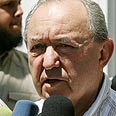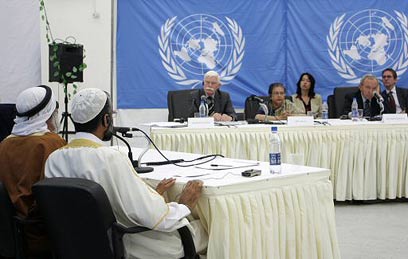
UN probe in Gaza: Especially painful testimonies
Richard Goldstone and UN delegates hear testimonies of Gaza Strip residents as part of UN Human Rights Council's investigation of Operation Cast Lead. According to Goldstone, goal of hearing is to bring story of victims to world
Goldstone said that the purpose of the hearings, which were held throughout the past two days, is to bring the voice of the Gazan victims to the world. The UN delegation leader also added that the delegates found it difficult to disguise their emotions as they heard the difficult and painful testimonies.
He noted that the mission has completed the first segment of the hearings. Next, the UN mission will examine the data collected thus far by the delegation prior to submitting a final report in August.
He hailed the dignity and composure of the witnesses whose testimony had "let the face of human suffering be seen".
"As fellow human beings we would like to put on record how deeply moved we were by many of the accounts of profound suffering and grief we have heard in the last two days," Goldstone added.

Hearing testimonies in the Gaza Strip (Photo: AFP)
Goldstone said that some of the witnesses giving testimony expressed their willingness to speak publicly, only to revoke their offers later out of fear that doing so would put their lives in danger.
Around 20% of children in Gaza suffer from post-traumatic stress syndrome brought on by witnessing violent acts, child psychologist Dr Iyad Sarraj told the panel.
"The amount of killing and blood that they have seen or that their relatives have suffered from... it's a huge amount, and this leads to negative psychological feelings, to radicalism and a cycle of violence," he said.
Israeli authorities have so far refused to allow the investigators into the country and have accused the mission of bias against the Jewish state.
Defense Minister Ehud Barak aired this concern before UN Secretary General Ban Ki-Moon during their meeting last month.
"We view the mandate this committee has received to deal with war crimes as a very serious matter. We will apparently not be cooperating with this committee, even though Goldstone is extremely well-respected both in the world and (by Israel)," he said.
Reuters contributed to this report










